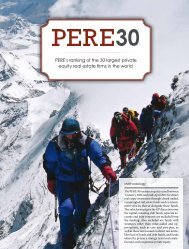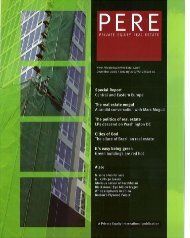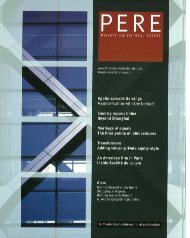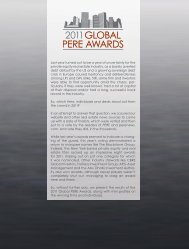2010AWARDS & AnnuAL REVIEW - PERE
2010AWARDS & AnnuAL REVIEW - PERE
2010AWARDS & AnnuAL REVIEW - PERE
Create successful ePaper yourself
Turn your PDF publications into a flip-book with our unique Google optimized e-Paper software.
As one real estate deal professional argued to <strong>PERE</strong>, for many<br />
of the larger institutional investors, registration – in essence, the<br />
SEC’s seal of approval – will be an absolute must. “This is a game<br />
changer in terms of how a firm markets itself,” he said.<br />
Recap impasse<br />
By backing a recapitalisation plan for<br />
stockbridge real estate’s $1bn Fund ii, were its<br />
lPs helping kick-start a turnaround or postponing<br />
inherent problems?<br />
Many GPs spent much of the past two years facing several unpleasant<br />
truths about their portfolios, mainly that they paid<br />
too much and employed too much leverage. In 2010, in order<br />
to salvage some value from their funds and deals – and with it<br />
their reputations – many fund managers asked LPs to dig a little<br />
deeper in their pockets to allow for a recapitalisation.<br />
In being asked to put up rescue capital, however, LPs faced a<br />
dilemma. Aside from questioning whether the fund or deal is<br />
worth recapitalising in the first place, are LPs rewarding GP failure<br />
by investing additional cash or just being pragmatic about<br />
trying to recoup some equity from a troubled situation?<br />
Los Angeles Fire and Police Pensions (LAFPP) faced that<br />
situation in the summer of 2010 as an investor in the $1 billion<br />
Stockbridge Real Estate Partners II fund. After several recapitalisation<br />
plans were rejected by LPs, San Francisco-based<br />
Stockbridge succeeded in proposing a new, final plan to LPs<br />
that addressed investors’ concerns regarding debt load, priority<br />
payments and management fees. Under the plan, LAFPP might<br />
see a potential return on its original and recap commitment of<br />
between 31 cents and 69 cents on the dollar.<br />
The caveat in all this, of course, is the word “might”.<br />
On-demand LPs<br />
A growing trend among us public pensions to<br />
broadcast board and investment committee<br />
meetings was an opportunity for GPs to win new<br />
lP relationships<br />
On 2 December 2009, Wes<br />
Edens, co-founder of Fortress<br />
Investment Group, walked<br />
into the Oregon Investment<br />
Council for a candid conversation<br />
about the performance<br />
of his funds. Like most private<br />
equity and real estate<br />
Edens: publicity via Oregon funds, Fortress’ performance<br />
was taking a hit. Indeed, the<br />
firm’s $5 billion Fortress Investment Fund V, closed in 2007, was<br />
projecting a 0.44x multiple at the time.<br />
So when Nori Gerardo Lietz, chief strategist for private real<br />
estate at Partners Group and Oregon’s consultant, challenged<br />
Edens over whether Fortress could ever return the pension’s<br />
investment “100 cents on the dollar”, Edens admitted that for<br />
Fund V “it’s not likely you’ll make two times your money.”<br />
What was surprising is that such private conversations between<br />
LP, GP and consultants increasingly are making it into the public<br />
eye, as US public pensions raise the level of transparency into<br />
their operations – and investments.<br />
The conversation between Gerardo Lietz and Edens was part<br />
of the pension plan’s normal policy of disclosure, but Oregon<br />
was not alone in opening its doors to greater public scrutiny. In<br />
July, the $94 billion Teachers’ Retirement System of Texas also<br />
started webcasting its full board meetings, although not its investment<br />
management committee sessions.<br />
While many real estate GPs would balk at such openness,<br />
those worth their salt should see the increasingly open nature<br />
of their business as an opportunity to set themselves apart<br />
from the rest of the crowd, rather than an assault on a private<br />
industry. By being one of those fund managers that openly and<br />
honestly communicates with its LPs – and is publicly seen to be<br />
doing so – a GP can boost his or her reputational standing with<br />
a vast gamut of investors at the click of a button.<br />
Public market envy<br />
Private real estate funds considered taking their<br />
portfolios public as they faced sunken values<br />
and a moribund fundraising market. would the<br />
public market’s attraction prove short-lived?<br />
In late January, Michael Fascitelli, chief executive officer of Vornado<br />
Realty Trust, underscored one of the predicaments facing<br />
private equity real estate funds today given the tough fundraising<br />
environment. In reportedly trying to raise $1 billion for its<br />
debut private equity real estate vehicle, Vornado Capital Partners,<br />
he told a New York real estate conference that it would take<br />
him no more than two days to raise the same amount in the<br />
public markets.<br />
The same certainly cannot be said of the private real estate<br />
markets, with 2010 fundraising levels sinking below even the<br />
trough experienced in 2009. Such a fundraising disconnect was<br />
prompting some private real estate fund managers to eye the<br />
public markets with envy.<br />
Howard Roth, global head of real estate at Ernst & Young,<br />
said several private equity real estate firms were looking to “roll<br />
up” assets from one or a number of funds into publicly-traded<br />
REITs. “It’s definitely an idea that’s percolating,” he said. Indeed,<br />
in the February 2011 issue of <strong>PERE</strong>, RLJ Development was<br />
said to be exploring such an idea for its Urban Lodging Fund II<br />
and Fund III.<br />
However, aggregating fund assets into a REIT IPO is no easy<br />
matter and, for all its faults, the private fund model remained a<br />
compelling investment model in 2010. For those GPs in search<br />
of answers to portfolio problems, it may well pay better not to<br />
covet their public cousins too much.<br />
2010 AwArds & AnnuAl review | <strong>PERE</strong> 33







